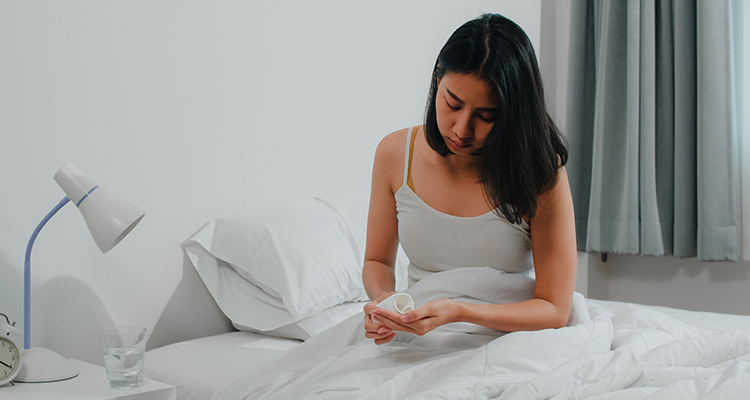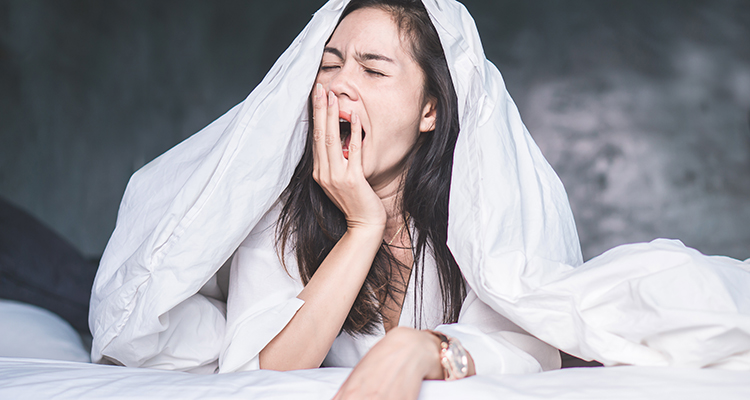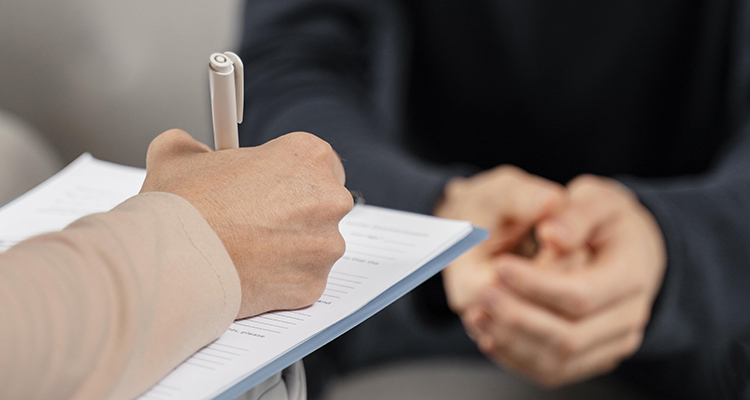Living with Idiopathic Insomnia
While insomnia plagues nearly 30% of the world’s population, most cases are caused by an underlying condition or trigger. This is known as secondary insomnia. Causes vary greatly but include things like stress, anxiety, chronic pain, and certain medications. Most insomnia treatment is designed to treat the underlying cause of your sleep disturbances. By doing so, most patients slowly start to see an improvement in both sleep quality and quantity.

There are, however, those rare occasions where your sleep troubles have no obvious cause. This is known as idiopathic insomnia and it can be very frustrating for sufferers. With no obvious trigger for your sleep troubles, people become discouraged, hopeless, and even depressed over their inability to achieve quality sleep.
Here we’ll take a closer look at idiopathic insomnia including symptoms and treatment options.
Content
What is Idiopathic Insomnia?
Idiopathic insomnia is a type of chronic insomnia with no visible or identifiable cause. Research suggests that these inconsistent sleep patterns are due to an overactive awakening system or an underactive sleep system. This form of insomnia is extremely rare since countless factors can (and normally do) impact sleep.

Here are some of the most common causes of insomnia:
- Medication use
- Substance abuse (drugs or alcohol)
- Behavioral problems
- Mental health disorders
- Medical issues
- Poor sleep hygiene
- Psychiatric disorders
If you’re experiencing chronic sleep trouble despite being relatively healthy and practicing good sleep hygiene, you may be battling idiopathic insomnia. Sufferers report awakening frequently during the night and struggling to fall asleep, despite being physically tired. This inability to sleep comes without the presence of stress, anxiety, or medication use.
Signs and Symptoms of Idiopathic Insomnia
With no specific cause of idiopathic insomnia, it can be difficult to diagnose and treat. The best way to identify this uncommon sleep disorder is to pay close attention to the signs and symptoms.

Difficulty Falling Asleep
The inability to fall asleep at night can be incredibly frustrating. This is especially true if there’s no obvious cause. If you’re feeling physically tired and mentally relaxed enough to fall asleep but spend hours lying awake, it may be a sign of idiopathic insomnia. It’s not uncommon for those with this rare sleep disorder to experience yawning, heavy eyelids, and drowsiness leading up to bedtime but still find it impossible to fall asleep.
The same goes for those individuals who report having minimal stress or anxiety in their lives. Racing thoughts and anxiety over not being able to sleep can only exacerbate insomnia symptoms in some individuals. People with idiopathic insomnia go to bed feeling relaxed, calm, and happy but still can’t fall asleep. The same can be said for individuals who are physically healthy and relatively pain-free. Tossing and turning are common in those with idiopathic insomnia, even with a comfortable bed and sleeping position.
Frequent Awakenings
You may have no trouble falling asleep initially but find yourself waking up frequently. This is another distressing side effect of idiopathic insomnia. Some individuals report waking up several times a night for no obvious reason. Individuals with middle-of-the-night insomnia or underlying medical conditions can attribute these frequent awakenings to nightmares, pain, or increased urination. If none of these describes you but you’re still waking up during the night, you may be experiencing idiopathic insomnia.
A poor sleep environment and unhealthy sleep hygiene can also cause frequent awakenings. A room that’s too bright, noisy, or hot can all lead to restless sleep. The things you do leading up to bedtime can also impact how well you sleep. Unplugging from electronic devices at least one hour before bed is a must. The blue light from these screens prevents your brain from releasing the sleep hormone melatonin. Performing relaxing behaviors before bed like drinking hot tea, reading, or taking a soothing bath can improve sleep quality. If you perform these rituals or other healthy habits but still can’t achieve a quality night’s sleep, idiopathic insomnia could be to blame.
Diagnosing and Treating Idiopathic Insomnia
Other than the obvious signs that you’re having trouble sleeping and can’t pinpoint the cause, a sleep specialist or doctor can help diagnose idiopathic insomnia. Keep track of your sleep history so that your doctor can help rule out any triggers or underlying causes. A final diagnosis of this rare sleep disorder can take time since the causes of insomnia are vast. The specialist you work with will need to rule out any other potential causes before making a final determination.

Some doctors use a polysomnogram test to observe your sleep patterns. This sleep study is a multi-parametric test that records your brain waves, oxygen levels, heart rate, breathing, and eye and leg movement during sleep. It’s a common tool used to diagnose a range of sleep disorders including sleep apnea and narcolepsy.
Treating idiopathic insomnia isn’t much different than treating other sleep disorders. While there’s no cure for insomnia, certain lifestyle changes and adjustments can facilitate better sleep and lessen symptoms. Individuals with idiopathic insomnia may never cure all their sleep problems but may only suffer from periodic episodes of acute insomnia.
Improving Your Sleep Hygiene
Anyone dealing with insomnia, regardless of the type, can benefit from healthy sleep hygiene — also known as healthy sleep habits. Everything you do from the time you wake up until the time you (try) to go to sleep, affects how well you sleep. Individuals with idiopathic insomnia may feel like it doesn’t matter what they do, sleep continues to evade them. While this isn’t entirely false, improving your sleep hygiene can’t hurt and may help in unexpected ways.

Set a Sleep Schedule
Sometimes achieving quality sleep is about mind over matter. By conditioning your mind to prepare for sleep at consistent times, you can create a healthy circadian rhythm or sleep-wake cycle. Try going to bed and waking up at the same time every day. This includes weekends, holidays, and while on vacation. In time, you may find yourself getting tired at the same time automatically and waking up without the need for an alarm.
Create a Relaxing Sleep Environment
Countless things can act as distractions or stimulants that keep sleep at bay. Transform your bedroom into an oasis for sleep. Invest in comfortable bedding and pajamas. Use room darkening shades or a sleep mask to block out any light. A white noise machine or fan will help drown out any unwanted noise. Creating the ideal sleep environment is especially important for those with idiopathic insomnia. The ultimate goal is to achieve uninterrupted sleep.
It’s also important to reserve your bed for sleep and sex only. Engaging in other activities in bed like working, eating, or watching TV confuses your brain into thinking you should be awake and alert in bed. Instead, your mind should associate your bed with sleeping. Deepen this connection by not lying in bed awake for longer than 15 to 20 minutes. On those nights when you struggle to fall asleep, get up and perform a relaxing activity like a meditation or breathing exercise. Avoid turning on any bright lights. When you feel tired enough to go to sleep, return to the bedroom.
Perform Nightly Rituals
Humans are creatures of habit. Similar to setting your circadian rhythm by going to bed and waking at the same time each day, performing certain behaviors before bed every night can act as triggers to your brain that it’s time to prepare for sleep. Simple things like avoiding screentime 60 minutes before bed, writing in a journal, or having a cup of chamomile tea are all relaxing, therapeutic nighttime rituals.
By implementing some of these habits, you may find yourself falling asleep faster and achieving a higher quality of deep sleep.
Medication and Supplements
When all else fails, you can try sleep aids and supplements to help improve your sleep quality. Natural supplements like melatonin and chamomile act as mild sedatives to calm your nerves and induce sleep. In extreme cases, some people turn to prescription sleep medications.
This is common among those suffering from daytime fatigue including confusion, an inability to focus, cognitive difficulty. If your idiopathic insomnia is interfering with your personal life, professional obligations, or ability to function, it may be time to consider medication. Some studies show that sleep aids may cause adverse side effects in those with idiopathic insomnia, so be sure to consult a healthcare professional before incorporating these medications into your regime.
Don’t Let Idiopathic Insomnia Get You Down
Yes, dealing with idiopathic insomnia can be extremely frustrating and difficult. When faced with a major issue like the inability to sleep, most people expect concrete answers and solutions. Unfortunately, none exist for this type of insomnia. All you can do is remain patient and diligent with your sleep hygiene.

Somnus Therapy can help you understand and accept your sleep disorder diagnosis and find the best treatment options for your unique needs. From stimulus and sleep restriction therapy to CBT, we offer a multi-faceted approach to healing.
Start your journey toward better, more blissful sleep today!













